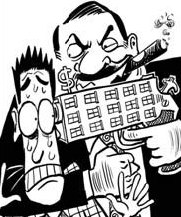Good housingplan can build harmony land

One sign is already pointing toward inflation: Frequent reports of record prices paid for land-use rights (all land is owned by the State in this country) at auctions held by local governments. The Chinese language press has started calling areas that fetch very high prices as "land kings". Now and then, we even hear about new "land kings" in regions where just a few months ago land prices were sluggish or even showed a downward trend.
It is a dangerous sign. It is not only an indication of a general rise in prices -- inflationary cycle fuelled primarily by asset prices in the property and securities markets -- but also tends to sow the seeds of disharmony in a society where many people are already bearing the brunt of the worst economic crisis of their lives.
Even worse, amid the vacuum of policies and programs coordinated by the central government, city authorities have practically got a free rein in planning their housing supplies and charges for granting land-use rights.
Within Beijing's Fourth Ring Road, for example, the minimum price for a house is reportedly 17,000 yuan per sq m. That is to say a small, 60-sq-m apartment will cost more than 1 million yuan, easily worth more than 20 years' income of an office employee with a graduate degree.
With land development and, more resentfully, redevelopment (some call it gentrification) projects sweeping across the ancient city, cheaper houses are being rapidly pushed to the semi-rural suburban areas, which are marked by poor public services.
The municipal government can, of course, make some immediate gains from its auction of land-use rights. But if that continues for a couple of years or a little more, Beijing could lose its appeal for migrating young people because of the rising cost of housing and the many things tied to it.
Once the city loses its appeal for them, it's likely to lose its color and vitality, too. If much of the capital is transformed into nothing but basically an enlarged model of its central business district (a white-elephant sort of example in city planning), it would soon have to pay a huge price for the loss of its social diversity.

It is disheartening to see artists and art dealers move out of 798, or the arts village set up by migrating young painters on the site of run-down factories and ware houses of a State-owned enterprise. Little has been reported on what help, if any, the municipal government is providing to the well-known "cultural district" and its residential artists.
We can put aside all the economic and business factors, such as the debate over where so much money from the government's huge lending programs (close to 7,400 billion yuan so far) would end up, whether so much money supply would generate a bubble effect in certain industries (which appears inevitable), and what kind of general price rises it would cause somewhere down the line. But if a city were to make land development as its sole source of revenue, as is the general practice in city-level public finance, it would be a deplorable mistake.
When the central government has given a free rein to cities for making money from their land resources, and all cities have turned to land development for their revenue, there is a danger that land developers could take the intermediary level of the People's Republic hostage.
If that happens, little can be done to prevent corruption among officials, either taking bribes from developers and forcing or influencing changes in former land-use rights. In either case, it would create tension among people and evoke protests for they will be compelled to think their sacrifices and contribution toward building a harmonious society have been in vain.
E-mail: younuo@chinadaily.com.cn
(China Daily 07/28/2009 page9)














